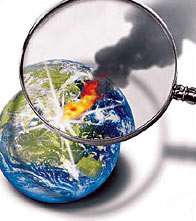 |
 |
 |
 Editorials | Environmental | February 2005 Editorials | Environmental | February 2005  
It's a Warmer World, But Does That Mean Armageddon?
 Alister Doyle - Reuters Alister Doyle - Reuters

When bears wake early from hibernation, Australia suffers its worst drought in 100 years and multiple hurricanes hammer Florida should we believe The End is nigh?

 That's the nub of a debate over the human impact on global warming that pits scientists who say such anomalies are signs of impending doom against those who say they are evidence that the earth's climate has always been chaotic. That's the nub of a debate over the human impact on global warming that pits scientists who say such anomalies are signs of impending doom against those who say they are evidence that the earth's climate has always been chaotic.

Amid those signs of warming, for instance, Algeria had its worst snow in 50 years last month.

This month 141 countries will attempt the best effort to arrest a forecasted continued rise of global temperatures by bringing into force the Kyoto protocol. The treaty is an agreement aimed at curbing emissions of gases from cars and industry, blamed for trapping the earth's heat.

"Dealing with (global warming) will not be easy. Ignoring it will be worse," the United Nations says.

At issue is how humanity should deal with global warming, the risks of which are not yet fully understood despite broad consensus among scientists that people are heating the planet with the emission of such heat-trapping gases as carbon dioxide.

Not everyone is convinced of Kyoto's importance. President Bush pulled the United States out of Kyoto in 2001, reckoning it will be too costly and that it wrongly excludes developing countries from cuts in emissions until 2012.

Bush accepts there are risks from climate change but says more research is needed -- exasperating even allies who say that the time for Kyoto-style caps on emissions is now.

"We're talking about spending perhaps $150 billion a year on Kyoto with fairly little benefit," said Bjorn Lomborg, Danish author of "The Skeptical Environmentalist."

Lomborg said that money would be better spent on combating AIDS and malaria, malnutrition and promoting fair global trade.

Biggest Threat?

Many climate scientists say that floods, storms and droughts will become more frequent and that climate change is the most severe long-term threat to the planet's life support systems. Rising temperatures could force up ocean levels, swamping coasts and low-lying Pacific islands and drive thousands of species to extinction by 2100.

But full proof is elusive.

A Caribbean hurricane season last year, when Florida was the first U.S. state to be hit by four hurricanes in one season since 1886, might be a fluke. Bears are waking in Estonia in the warmest winter in two centuries, again a possible climate freak.

"Imagine a pot of boiling water on the stove. If I turn up the heat I can't say that each bubble is from the extra heat," said Mike MacCracken, chief scientist for climate change programs at the Climate Institute, a Washington think-tank.

"But there are more bubbles and they're larger," he said, adding it was best to act now rather than risk disaster.

The warmest year at the world's surface since records began in the 1860s was 1998, followed by 2002, 2003 and 2004, according to the U.N.'s World Meteorological Organization.

World surface temperatures have risen by 0.6 degrees centigrade (1.1 degrees Fahrenheit) since the late 1800s when the Industrial Revolution started in Europe.

The Intergovernmental Panel on Climate Change, a group of 2,000 scientists which advises the United Nations, projects a further rise of 1.4-5.8 degrees centigrade by 2100. Even the lowest forecast would be the biggest century-long rise in 10,000 years.

Beyond Doubt?

Yet the evidence for a human impact on the climate falls short of being "beyond a reasonable doubt," the standard of proof needed in a criminal court.

"It is really for a legal mind to decide whether the scientific consensus of the IPCC provides findings that are beyond reasonable doubt," said IPCC chairman Rajendra Pachauri.

Many so-called skeptics concede that carbon dioxide stokes global warming but say U.N. models of what will happen in 2100 are about as reliable as tomorrow's weather forecast. Other factors, like variations in the sun's radiation, ash from volcanoes or other natural effects may have a bigger role, they say. The IPCC tries to account for all such effects.

"My bottom line is that natural variations are much larger than the human component," said George Taylor, state climatologist for Oregon state.

Backers of Kyoto say it is a blueprint for regulating the climate by cutting rich nations' emissions of carbon dioxide by 5.2 percent below 1990 levels by 2008-12. Supporters say that much deeper cuts will be needed after 2012.

In a landmark phrase in 1995, the IPCC said that the balance of evidence suggested a discernible human influence on the global climate. And its 2001 report spoke of "new and stronger" evidence that humans had caused warming in the past 50 years.

Pachauri said that he hoped the next report, in 2007, would fill in gaps in knowledge. But Washington has given no signs of being won over to Kyoto, preferring to focus on funding new clean technologies like hydrogen.

The Environmental Protection Agency says: "The fundamental scientific uncertainties are these: How much more warming will occur? How fast will this warming occur? And what are the potential adverse and beneficial effects? These uncertainties will be with us for some time, perhaps decades." | 
 | |
 |



